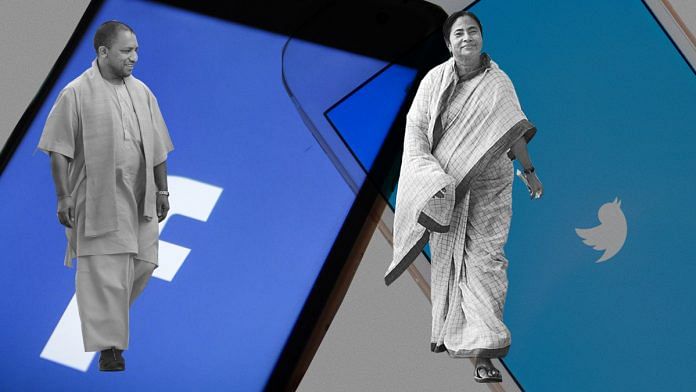Five people have been arrested in two days for posting or sharing content on social media that angered Uttar Pradesh CM Yogi Adityanath. Journalist Prashant Kanojia faces charges under IPC Section 500 and Section 66 of the IT Act. Legal observers say provisions don’t apply and are illegal. Last month, BJP worker Priyanka Sharma was arrested on similar charges for posting a meme of West Bengal CM Mamata Banerjee.
ThePrint asks: Do laws not matter as politicians like Yogi & Mamata go after ‘offensive’ online posts?
What we see today is an extension of policing powers that do not serve law but powerful people
 Apar Gupta
Apar Gupta
Executive Director, Internet Freedom Foundation
Some may question the underlying structural faults in India’s elections, but most maintain their belief in a system through which we elect our legislators. This allowance of power comes from the conception of a republic in which the powers of public officials are limited and subject to laws. Here we accede to a system of governance by laws, not men. Today, this concept faces threat from frequent arrests of social media users, and the instances reveal a disturbing malice.
The first indicators of the arbitrary application of criminal law on social media was the arrest of two young girls in Maharashtra under Section 66A of the Information Technology Act. This resulted in a media firestorm and public outrage. Ultimately, the Supreme Court struck down the provision holding it to be vague and hence capable of arbitrary application. The problem was that the provision had provided police departments and public officials an unguided power to arrest and jail social media users. They liked it for the very reason it was unconstitutional. And old habits die hard, especially those built of illegality. Today, what we see is a more egregious extension of policing powers that do not serve law but serve powerful women and men. Hence, the shocking use of provisions of law applied blatantly in an illegal and unconstitutional manner should not come as a surprise.
But it is necessary to maintain faith. After all, there are close to 550 million internet users in India and they are all under threat. Today, what is needed is a sense of purpose to not only undertake comprehensive speech reforms that are targeted towards ridding ourselves of colonial laws but also changing the approach of governance that serves the whims of political masters than the democratic polity of a modern, digital India.
Not right to suggest police is being unlawful, and no need to make the issue about one political party
 Chandra Mohan
Chandra Mohan
BJP UP spokesperson
The court will deliver a just verdict. We must have blind faith in the judiciary of this country. The police has done its job, and now it is up to the honourable court to act in the manner it feels is appropriate. Whatever the social media posts by these journalists, there is no point in discussing them given that the matter is now sub-judice.
It isn’t right to suggest that the police is being unlawful or unjust. What makes this country great is that the judicial process is the same for everyone – there is no prejudice or injustice meted out to anyone.
There is also no need to make this issue about one political party. This is hardly a political issue, so why do we want to politicise it unnecessarily? This isn’t a question of politics; this is merely a question of law and order. The police system and the judiciary exist for a reason — to ensure law and order aren’t played with. We need to be patient and let the law take its own course.
Also read: Now, Yogi govt arrests farmer & village head for social media posts on ‘CM wedding video’
Nothing else can be expected from Adityanath, who withdrew cases against himself after becoming CM
 Farman Naqvi
Farman Naqvi
Advocate, Allahabad High Court
In Prashant Kanojia’s case, the FIR was first lodged under Section 500 of the IPC (defamation) and Section 66 of the IT Act (computer-related offences). Later, they also added Section 505 of the IPC, and Section 67 of the IT Act (publishing or transmitting obscene material in electronic form). But none of what is mentioned in the FIR is enough to qualify any of the offences related to these sections.
Section 505 is applicable only in cases where individuals are found speaking against the military, or for instigating hate and animosity in society.
But the journalist in question did not do any of this. He shared an existing news report originally reported by another news channel. So far, no one has questioned or raised objections about the statement made by the woman in the video. No action has been taken against her. If no one is questioning her original statement, how can a journalist be arrested for merely sharing it? The entire FIR falls flat on its face because of the sections arbitrarily applied.
As for the general law and order situation in the state is concerned, what can be expected from Yogi Adityanath, who after becoming the chief minister, withdrew cases against himself? On the one hand, he meets people who were responsible for violence against Kashmiris in Lucknow; and on the opposite, he has sent a journalist to jail for merely sharing a video. It reflects poorly on the government and shows that Yogi Adityanath isn’t acting as the head of the state, but only acting in his personal interest. The Yogi government has reduced law and order to a joke.
People on social media should know the limits to freedom of speech
 Rishi Mohan
Rishi Mohan
Convenor, Hindu Yuva Vahini
The arrests have taken place because posts of those individuals showed a clear intention to ruin someone’s image. Even if those journalists are not behind the video themselves, they deliberately shared it in order to ensure more people see it.
Now that the journalists have been accused of a crime, an investigation is bound to take. But there are two aspects to ensuring justice — one that an innocent person should not be convicted and the other is that a culprit should not be set free. Therefore, I would suggest we let the judiciary do its job.
More importantly, we need to understand that freedom of speech should not be misused. People on social media should know the limits to freedom of speech. There has always been and will always be certain conditions to what can and cannot be posted on social media. If someone has violated these conditions, they are bound to face punishment.
The Information Technology Act makes it clear that one cannot post anything that has the potential to hurt an individual’s image, or religious sentiments, or incite violence. The video of the woman, which these journalists posted, might have been staged, but the truth will come out only when a detailed investigation takes place.
Also read: How SC defended freedom of speech by pulling up Mamata govt for blocking satirical film
Politicians misusing the law to stifle any content they find personally unacceptable is now a trend
 Akriti Bopanna
Akriti Bopanna
Policy Officer, Centre for Internet Society
The freedom of speech and expression granted to us by the Constitution is increasingly being curtailed by the widespread misuse of laws. Often times, the charges have no connection to the Act but political motivations are their raison d’être instead – such as in journalist Prashant Kanojia’s case.
Kanojia was initially charged with Section 66 of the Information Technology Act, which punishes fraudulent damaging of a computer system. The revised charges of Sections 67 of the IT Act and 505 of the IPC are inapplicable as well since they refer to publishing of obscene material and creating public mischief, respectively. Neither of the sections can be attracted by his simple act of sharing a post of a woman expressing an interest in marrying the chief minister.
Laws such as Section 66A of the IT Act, which was struck down for being unconstitutional in 2015, is still being used to target citizens whereas IPC Section 500 dealing with criminal defamation has also become a go-to provision for frivolous cases. Being a non-cognizable offence, it necessitates the person being defamed to file a complaint for any legal process to commence, in this case the CM. Regardless of this, it’s the UP police that carried out the arrest.
While the Supreme Court has granted bail to the worker arrested for sharing a meme pertaining to West Bengal chief minister Mamata Banerjee, it is extremely concerning that individuals have to go to the Supreme Court to fight for their freedom to merely share a meme that did not incite any kind of violence but was of a humorous nature. Sadly, this has now become a trend where politicians misuse the law to stifle any content that they find personally unacceptable.
By Fatima Khan, journalist at ThePrint.




Prashant Kishore,rabish Kumar,prashoon pandey etc they are to banned or should be declared as traitor and must be punished with life time prisonment
Section 66 A of the IT Act was struck down by the apex court in 2015. It has been invoked in the present case. This should be grounds to move against the errant policemen in suo moto contempt. As the apex court may be pleased to do when sedition charges are applied in contravention of guidelines framed by it in 1962.
Seldom has the ordinary citizen appeared so puny and inconsequential before the might of the state. It is for the apex court to not only grant relief in respect of cases such as Shri Prashant Kanojia’s which are before it but to issue binding directions in the operative part of the order – not mere obiter dicta – that will deter police forces all over the country from treating a citizen’s liberty as something wholly dependent on their benevolence and magnanimity.